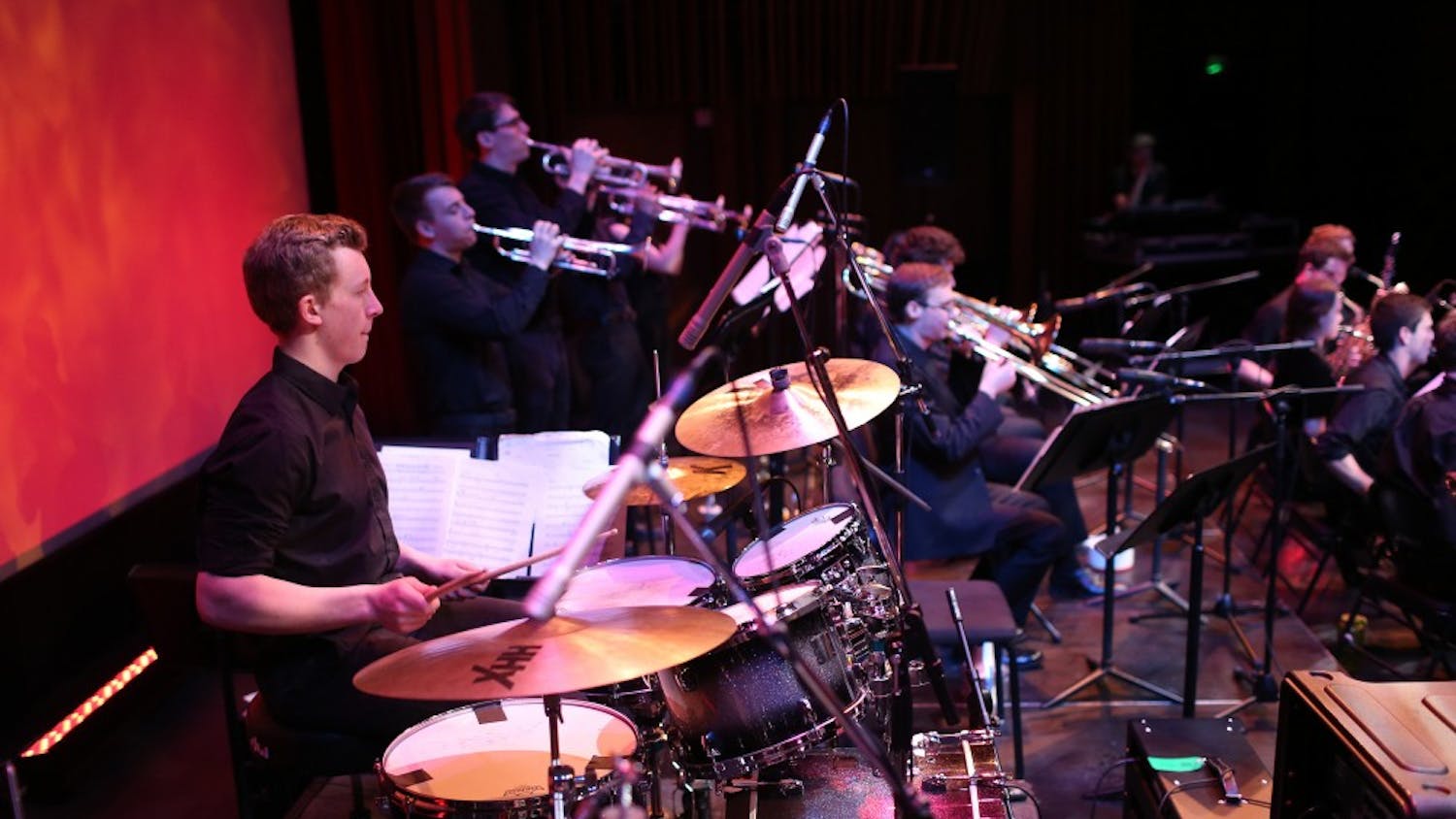A wise man once said, “Come for the music, stay for the message.”
For those who attended musician Carla Bley’s performance with the Coast Jazz Orchestra, formerly known as the Barbary Coast Jazz Ensemble, last Saturday night in Spaulding Auditorium, this parable rings true.
In a double-bill performance, the Dartmouth ensemble showcased a wide selection of Bley’s big band forms from the past 50 years before Bley then took the stage with long-time colleagues Andy Sheppard and Steve Swallow on saxophone and bass, respectively.
As an accomplished pianist, composer and bandleader, notable for her contribution to the free jazz movement of the 1960s, Bley’s reputation precedes her. Bringing in a world-class artist like Bley is exemplary of the Hopkins Center’s efforts to expose Dartmouth to a broader artistic community beyond the campus.
“At the Hop, we’re trying to bring the world of ideas and cultures to little Hanover,” said Rebecca Bailey, Hopkins Center’s publicity director. “We feel strongly that the arts are an important part of the educational experience and can provide an opportunity to grow in your perspective.”
Certainly, the energy one feels in this unique collaboration is palpable. With the help of Bley’s daughter, Karen Mantler, a talented pianist and composer in her own right, the Coast Jazz Orchestra played selections from Bley’s “Escalator Over the Hill” with every ounce of nuance and swing that Bley’s forms merit.
In watching the trio of Bley, Sheppard and Swallow perform a set ripe with humor and artistic turn of phrase, the audience bore witness to a unique synthesis of old and new. In the auditorium, jazz transcended generations.
It would seem as though the spirit of this collaboration was not lost on the Coast Jazz Orchestra musicians themselves. Christopher Damon ’22, splitting his time between the bass and the bassoon, spoke of the experience fondly.
“It’s inspiring to see the trails [Bley, Sheppard and Swallow] have blazed for themselves,” Damon said. “We’ve put in a lot of extra hours and extended rehearsals, but I enjoy doing it so I’m not really fazed. A lot of [Bley’s] music is about improvisation. I like getting out of my comfort zone and immersing myself in the music to get something good out of it,” he continued.
Damon performed a funk bassoon solo in Bley’s arrangement of “Old MacDonald Had a Farm” on Saturday.
This collaboration would perhaps not have been possible without the efforts of Coast Jazz Orchestra director Taylor Bynum, who described Bley’s trio as a “dream team.” Bynum, who emphasizes the importance of intergenerational collaboration in jazz tradition, was in contact with Bley for almost a year to get the project off the ground.
“All of the artists we invite represent people who draw from tradition but understand that the deepest tradition is to find your own voice,” Bynum said, acknowledging the importance of new perspectives and aesthetic diversity in programming at the Hopkins Center.
For Bynum, the knowledge Bley has to impart through her music is invaluable to both a music education and an understanding of the human condition.
“Jazz improvisation is one of the most essential and human things we do. It’s very real and it’s hella funny,” Bynum said. “There are core principles about balancing out the individual and the ensemble; the freedom and the discipline. It’s an opportunity where people can listen to each other with a shared vocabulary.”
The sense of community Bynum speaks of was obvious when Bley, Sheppard and Swallow took the stage. The three passed around melodies and exchanged quotes with a profound sense of trust and musicality. Amidst blues scale runs and saxophone swells, one felt as though they were listening in on a conversation. It was fascinating to watch three performers, each with decades of experience to their name, finding new things to say to one another.
At the performance’s pre-talk, held in the atrium of the Hood Museum, the musicians of the trio reflected on what makes jazz music such a challenging and rewarding art form.
“We know each other extremely well,” Swallow said. “We finish each other’s sentences, and that’s central to music-making.”
These sentiments were echoed by Bley, who first commended the Coast Jazz Orchestra for their performance of her repertoire.
“What a band! The [Coast Jazz Orchestra] amazed and delighted me … even when they made mistakes,” Bley joked. “I love mistakes. I thrive on them.”
Bley further encouraged members of the orchestra to take risks in their musicianship, saying that “all the accidents that are happening in any art form are interesting. You can try to correct them, or you can try to elaborate on how wrong they are.”
At the talk’s conclusion, Bailey commented on the value of bringing in seasoned performers such as Bley to interact with students of the College.
“Working with an artist like this, you not only learn a lot about the art form from the artist who is creating it, but you also have a chance to learn about the discipline it takes, the humor it takes and the working relationships it requires,” Bailey said. “You’re learning what it means to master something. Whether you go on to apply that to music or elsewhere, you still have a lesson in devotion that will serve you well.”
Bynum also spoke to the broader importance of Saturday’s performance and maintaining a jazz scene on Dartmouth’s campus.
“[Bley’s] music celebrates radical individualism and radical collectivism,” Bynum said. “As long as human beings feel a need to be expressed, this music will remain relevant.”


